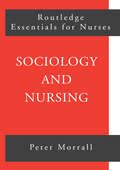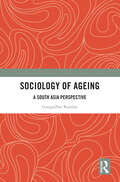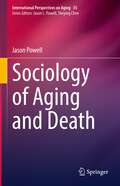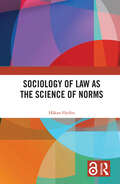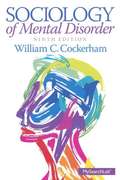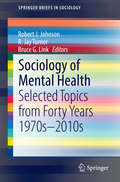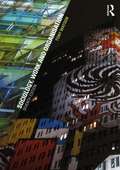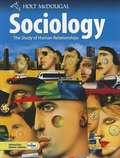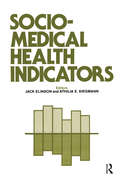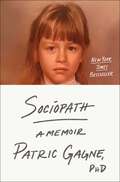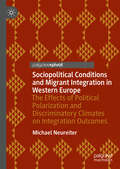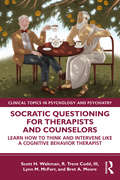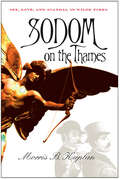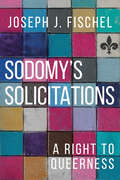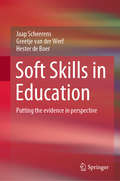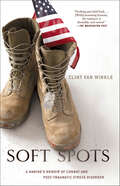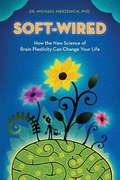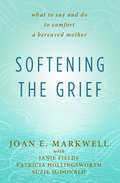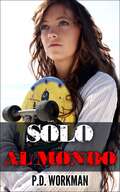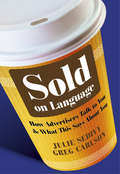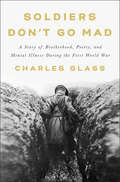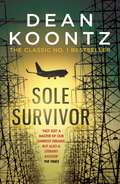- Table View
- List View
Sociology and Nursing: An Introduction (Routledge Essentials For Nurses Ser.)
by Peter MorrallThis introductory text provides nurses with the foundations of a sociological understanding of health issues which they should find of great help in thinking about their work and the role of their profession. It explains the key sociological theories and debates with humour and imagination in a way which will encourage an inquisitive and reflective approach on the part of any student who engages with the text.
Sociology of Ageing: A South Asia Perspective
by Gangadhar KaralayThis book examines the biological, psychological, and sociocultural aspects of challenges related to ageing in India. It does so by widely referring to research works beyond the disciplinary boundary of sociology to help develop a lucid yet critical understanding of sociological ageing.Apart from providing an invaluable introduction to the major issues involved in the study of ageing from a sociological perspective, this book discusses demographic perspective, social dimensions, social support, and state policies in detail. It aptly describes challenges faced by elderly people and avenues of opportunities available to them to remain actively engaged in life.This book would be useful to the students, researchers and teachers of Sociology, Social Work, Public Health and Psychology. It would also be an invaluable companion to professionals working in the field of Gerontology, Health and Social care, and NGOs working with older people.
Sociology of Aging and Death (International Perspectives on Aging #35)
by Jason PowellThis book presents a critical analysis and examination of the major theories and social issues in the social construction of aging and death. It is concerned with the impact of death and places how our experiences of death are transformed by the roles that truth and discourse about aging play in everyday life. A major element of the book is an examination of the way in which groups and individuals employ specific representations of mortality in order to construct meaning and purpose for life and death. To accentuate this, the book provides an investigation into the social construction of death practices across time and space. Special attention is given to the notion of death as a socially accomplished phenomenon grounded in a unique sociological introduction to the meaning of death throughout history to the present. The purpose of this book is to critically inform debates concerning the abstract and empirical features of death examined through the lens of sociological perspectives. This book explores the emergent biomedical dominance relating to ageing and death. An alternative is advocated which re-interprets ageing for Graduate schools. This innovative book explores the concept, history and theory of aging and its relationship to death. Traditionally, many books have focused on older people dying of 'natural causes', a biomedical explanatory framework. This book looks at alternative social theories and experiences with aging and relate to death in different countries, victims, crime, imprisonment and institutional care. Are these deaths avoidable? If so, what are the solutions the book addresses. This is one of the first books that re-interprets aging and its relationship of examples of death. It will be of essential reading for graduate students and researchers in understanding these different examples of aging and death across the globe.
Sociology of Law as the Science of Norms (Studies in the Sociology of Law)
by Håkan HydénThis book proposes the study of norms as a method of explaining human choice and behaviour by introducing a new scientific perspective. The science of norms may here be broadly understood as a social science which includes elements from both the behavioural and legal sciences. It is given that a science of norms is not normative in the sense of prescribing what is right or wrong in various situations. Compared with legal science, sociology of law has an interest in the operational side of legal rules and regulation. This book develops a synthesizing social science approach to better understand societal development in the wake of the increasingly significant digital technology. The underlying idea is that norms as expectations today are not primarily related to social expectations emanating from human interactions but come from systems that mankind has created for fulfilling its needs. Today the economy, via the market, and technology via digitization, generate stronger and more frequent expectations than the social system. By expanding the sociological understanding of norms, the book makes comparisons between different parts of society possible and creates a more holistic understanding of contemporary society. The book will be of interest to academics and researchers in the areas of sociology of law, legal theory, philosophy of law, sociology and social psychology.
Sociology of Mental Disorder (9th Edition)
by William C. CockerhamThis edition of book is includes the most recent literature and research on mental disorder including topics like DSM-5, examining socio-demographic factors, assessment of differences between male-female psychological distress etc.
Sociology of Mental Health
by Robert J. Johnson R. Jay Turner Bruce G. LinkThis volume provides an overview of mental health research conducted by sociologists. It discusses dominant themes such as stress, the community and mental life, family structure, social relations and recovery. The unique contribution of sociology to the study of mental health has a long history stretching from the very foundations of modern sociology. Yet it was only twenty years ago that the Section on Sociology of Mental Health of the American Sociological Association was formed largely in response to a burgeoning rise in the sum and significance of research in the field. Today the section is a large and vibrant one with its own journal, Society and Mental Health. This book explores several of the themes that have occurred during that period, providing both perspectives of the past and prospects for the future. The volume is timely, following closely the 20th anniversary of the section's formation. Its coverage of key issues and its advancement of the scholarly debates on these issues will prove valuable to students and senior scholars alike.
Sociology, Work and Organisation: Seventh Edition
by Tony WatsonThe seventh edition of Sociology, Work and Organisation is outstandingly effective in explaining how we can use the sociological imagination to understand the nature of institutions of work, organisations, occupations, management and employment and how they are changing in the twenty-first century. Intellectual and accessible, it is unrivalled in the breadth of its coverage and its authoritative overview of both traditional and emergent themes in the sociological study of work and organisation. The direction and implications of trends in technological change are fully considered and the book recognises the extent to which these trends are intimately related to changing patterns of inequality in modern societies and to the changing experiences of individuals and families. Key features of the text are: clear structure; ‘key issue’ guides and summaries with each chapter; identification of key concepts throughout the book; unrivalled glossary and concept guide; rich illustrative snapshots or ‘mini cases’ throughout the book. This text engages with cutting-edge debates and makes conceptual innovations without any sacrifice to clarity or accessibility of style. It will appeal to a wide audience, including undergraduates, postgraduates and academics working or studying in the area of work and the organisation of work, as well as practitioners working in the area of human resources and management generally.
Sociomedical Health Indicators
by Jack Elinson Athilia E SiegmannIncludes a series of fact-filled articles aimed at replacing blind faith in the effectiveness of health services with objective standards for health care delivery. This title is intended for various health care practitioners.
Sociopath: A Memoir
by Ph.D. Patric GagneThe acclaimed New York Times bestselling memoir of the author&’s struggle to understand her own sociopathy and shed light on the often maligned and misunderstood mental disorder. &“A cross between a podcast by relationship therapist Esther Perel and a salacious tell-all.&” —San Francisco ChroniclePatric Gagne realized she made others uncomfortable before she started kindergarten. Something about her caused people to react in a way she didn&’t understand. She suspected it was because she didn&’t feel things the way other kids did. Emotions like fear, guilt, and empathy eluded her. For the most part, she felt nothing. And she didn&’t like the way that &“nothing&” felt.She did her best to pretend she was like everyone else, but the constant pressure to conform to a society she knew rejected anyone like her was unbearable. So Patric stole. She lied. She was occasionally violent. She became an expert lock-picker and home-invader. All with the goal of replacing the nothingness with...something.In college, Patric finally confirmed what she&’d long suspected. She was a sociopath. But even though it was the very first personality disorder identified—well over 200 years ago—sociopathy had been neglected by mental health professionals for decades. She was told there was no treatment, no hope for a normal life. She found herself haunted by sociopaths in pop culture, madmen and evil villains who are considered monsters. Her future looked grim.But when Patric reconnects with an old flame, she gets a glimpse of a future beyond her diagnosis. If she&’s capable of love, it must mean that she isn&’t a monster. With the help of her sweetheart (and some curious characters she meets along the way) she embarks on a mission to prove that the millions of Americans who share her diagnosis aren&’t all monsters either.This is the inspiring story of her journey to change her fate and how she managed to build a life full of love and hope.
Sociopolitical Conditions and Migrant Integration in Western Europe: The Effects of Political Polarization and Discriminatory Climates on Integration Outcomes
by Michael NeureiterThis book brings new insight from social psychology to explore migrant integration in Western Europe. Through a series of survey studies it illustrates the importance of sociopolitical conditions, such as political polarization and discriminatory climates, for understanding cross-national variation in migrant integration outcomes. The author investigates how migrants integrate; what factors facilitate or hinder successful integration; and how successes and failures along the way affect subsequent integration outcomes. An inspiring read for researchers and students alike interested in migration studies, political behaviour, social psychology, and international policy, this book aims to promote more effective migrant integration policies within the European Union and elsewhere.
Socrates and Self-Knowledge
by Christopher MooreIn this book, the first systematic study of Socrates's reflections on self-knowledge, Christopher Moore examines the ancient precept 'Know yourself' and, drawing on Plato, Aristophanes, Xenophon, and others, reconstructs and reassesses the arguments about self-examination, personal ideals, and moral maturity at the heart of the Socratic project. What has been thought to be a purely epistemological or metaphysical inquiry turns out to be deeply ethical, intellectual, and social. Knowing yourself is more than attending to your beliefs, discerning the structure of your soul, or recognizing your ignorance - it is constituting yourself as a self who can be guided by knowledge toward the good life. This is neither a wholly introspective nor a completely isolated pursuit: we know and constitute ourselves best through dialogue with friends and critics. This rich and original study will be of interest to researchers in the philosophy of Socrates, selfhood, and ancient thought.
Socratic Questioning for Therapists and Counselors: Learn How to Think and Intervene Like a Cognitive Behavior Therapist (Clinical Topics in Psychology and Psychiatry)
by Bret A. Moore Scott H. Waltman R. Trent Codd, III Lynn M. McFarrThis book presents a framework for the use of Socratic strategies in psychotherapy and counseling. The framework has been fine-tuned in multiple large-scale cognitive behavior therapy (CBT) training initiatives and is presented and demonstrated with applied case examples. The text is rich with case examples, tips, tricks, strategies, and methods for dealing with the most entrenched of beliefs. The authors draw from diverse therapies and theoretical orientation to present a framework that is flexible and broadly applicable. The book also contains extensive guidance on troubleshooting the Socratic process. Readers will learn how to apply this framework to specialty populations such as patients with borderline personality disorder who are receiving dialectical behavior therapy. Additional chapters contain explicit guidance on how to layer intervention to bring about change in core belief and schema. This book is a must read for therapists in training, early career professionals, supervisors, trainers, and any clinician looking to refine and enhance their ability to use Socratic strategies to bring about lasting change.
Sodom on the Thames
by Morris B. KaplanSodom on the Thames looks closely at three episodes involving sex between men in late-nineteenth-century England. Morris Kaplan draws on extensive research into court records, contemporary newspaper accounts, personal correspondence and diaries, even a pornographic novel. He focuses on two notorious scandals and one quieter incident. In 1871, transvestites "Stella" (Ernest Boulton) and "Fanny" (Frederick Park), who had paraded around London's West End followed by enthusiastic admirers, were tried for conspiracy to commit sodomy. In 1889–1890, the "Cleveland Street affair" revealed that telegraph delivery boys had been moonlighting as prostitutes for prominent gentlemen, one of whom fled abroad. In 1871, Eton schoolmaster William Johnson resigned in disgrace, generating shockwaves among the young men in his circle whose romantic attachments lasted throughout their lives. Kaplan shows how profoundly these scandals influenced the trials of Oscar Wilde in 1895 and contributed to growing anxiety about male friendships. Sodom on the Thames reconstructs these incidents in rich detail and gives a voice to the diverse people involved. It deepens our understanding of late Victorian attitudes toward urban culture, masculinity, and male homoeroticism. Kaplan also explores the implications of such historical narratives for the contemporary politics of sexuality.
Sodomy's Solicitations: A Right to Queerness (Sexuality Studies)
by Joseph J. FischelJoseph Fischel’s provocative book, Sodomy’s Solicitations, builds out a politics of sexual justice that challenges state sex exceptionalism. By tracing several twenty-first century contestations around Louisiana anti-sodomy laws, Fischel examines patterns and practices of sexual injustice that are too easily eclipsed by our collective focus on marginalized identities. The political stories narrated in Sodomy’s Solicitations are undoubtedly stories of racism, sexism, homophobia, and transphobia, but they are also stories of other political problems—and political possibilities. Fischel indicts U.S. sex offender regulatory regimes as state-sponsored sexual violence; offers a qualified defense for sexual expression in public; and argues that animal sexual abuse laws, with their exemptions for industrial agricultural practices, authorize the suffering they were enacted to deter. He also makes the case that laws criminalizing the exchange of sex for money are unconstitutional, and proposes that the best way to protect trans and queer children might just be to enfranchise them. Sodomy’s Solicitations champions a right to queerness across rather than within identity formations—a right to relatively unpoliced gender, sexual, and intimate pluralism. In the series Sexuality Studies
Soft Computing Techniques in Engineering Applications
by Srikanta Patnaik Baojiang ZhongThe Soft Computing techniques, which are based on the information processing of biological systems are now massively used in the area of pattern recognition, making prediction & planning, as well as acting on the environment. Ideally speaking, soft computing is not a subject of homogeneous concepts and techniques; rather, it is an amalgamation of distinct methods that confirms to its guiding principle. At present, the main aim of soft computing is to exploit the tolerance for imprecision and uncertainty to achieve tractability, robustness and low solutions cost. The principal constituents of soft computing techniques are probabilistic reasoning, fuzzy logic, neuro-computing, genetic algorithms, belief networks, chaotic systems, as well as learning theory. This book covers contributions from various authors to demonstrate the use of soft computing techniques in various applications of engineering.
Soft Skills in Education: Putting the evidence in perspective
by Jaap Scheerens Greetje van der Werf Hester de BoerThis book examines the global movement of putting more emphasis on students’ social and emotional development in education. It provides some order in the unstructured multitude of desirable socio-emotional educational objectives and ambitions that have resulted from this movement and builds on a careful conceptual analysis. It starts out by examining the roots of the movement and discusses different emphases. Next it makes use of instructional and psychological constructs and theories to arrive at meaningful categorizations of major domains and types of social-emotional “skills”. One of the key assumptions is that social and emotional attributes are malleable by means of educational interventions. The book reviews available research evidence for this assumption, taking into account psychological studies and meta-analyses. It then creates new evidence based on a new meta-analysis, which concentrated on the effects of educational interventions on skills associated with the conscientiousness factor of the Big5 taxonomy. In the final chapter, the book discusses the implications for educational policy and practice; a discussion in which attention is given to political and ethical questions about the desirability of treating social and emotional attributes as educational goals.
Soft Spots: A Marine's Memoir of Combat and Post-Traumatic Stress Disorder
by Clint Van WinkleA powerful, haunting, provocative memoir of a Marine in Iraq—and his struggle with Post Traumatic Stress Disorder in a system trying to hide the damage done Marine Sergeant Clint Van Winkle flew to war on Valentine's Day 2003. His battalion was among the first wave of troops that crossed into Iraq, and his first combat experience was the battle of Nasiriyah, followed by patrols throughout the country, house to house searches, and operations in the dangerous Baghdad slums. But after two tours of duty, certain images would not leave his memory—a fragmented mental movie of shooting a little girl; of scavenging parts from a destroyed, blood-spattered tank; of obliterating several Iraqi men hidden behind an ancient wall; and of mistakenly stepping on a "soft spot," the remains of a Marine killed in combat. After his return home, Van Winkle sought help at a Veterans Administration facility, and so began a maddening journey through an indifferent system that promises to care for veterans, but in fact abandons many of them. From riveting scenes of combat violence, to the gallows humor of soldiers fighting a war that seems to make no sense, to moments of tenderness in a civilian life ravaged by flashbacks, rage, and doubt, Soft Spots reveals the mind of a soldier like no other recent memoir of the war that has consumed America.
Soft-Wired: How the New Science of Brain Plasticity Can Change Your Life
by Michael MerzenichWhat if you had the power to change your brain for the better? In Soft-Wired, Dr. Michael Merzenich--a world authority on brain plasticity--explains how the brain rewires itself across the lifespan, and how you can take control of that process to improve your life. In addition to fascinating descriptions of how your brain has produced your unique memories, skills, quirks, and emotions, Soft-Wired offers sound advice for evaluating your brain and gives clear, specific, scientifically proven guidance for how to rejuvenate, remodel, and reshape your brain to improve it at any age.
Softening the Grief: What to Say and Do to Comfort a Bereaved Mother
by Janie Fields Joan E Markwell Patricia Hollingsworth Suzie McdonaldSoftening the Grief is a companion for grieving mothers so they know they are not alone and a resource for people who care but are afraid they will say the wrong thing. This book provides the right things to say and do. Learn what words will truly bring comfort rather than pain to a grieving mother. Understand the emotional challenges faced by a grieving mother, even months and years after the loss of her child. Appreciate the inability of a bereaved mother to forget her pain - ever. Learn how to support and comfort a bereaved mother with confidence. Know what to say and do without adding more pain. It takes a lot of courage and guts and painful experience to do what these ladies have done in writing this book. I applaud them all and I thank them for sharing these words of wisdom. I will certainly keep a couple of copies of this book on hand to gift; there is always someone who can use the help. --- LeeAnn Roberts, Tucson, AZ - mother of Nicole who died at age 25. This book took me on a roller coaster of my own emotions and memories. I love when I read words from other people who accurately describe what I can’t and this book did that a lot. Softening the Grief provided great conversations for my husband and me as we continue on our own personal journey of grief and healing. --- Colleen H. Laszakovits RN-BSN, CPD, CLE, Tucson, AZ - mother of Jensen who died at 9 days old. As a grieving mother myself, I felt a deep connection to these four authors. Their heartfelt book will be a comforting resource to help guide not only grieving mothers but anyone going through the grief journey with them. --- Nancy Bennett, retired art teacher and mother of Jessica who died in 2014.
Sola al mondo
by P. D. WorkmanJustine è pazza? Tutti la pensano così... Sua madre, i compagni di scuola, gli insegnanti. Perfino la polizia che la scova sempre nelle sue escursioni notturne. Soprattutto loro. Il suo analista la definisce "instabile", ma il significato è lo stesso. È convinto che i suoi incubi, vividi e ricorrenti, e il suo comportamento feroce indichino un trauma passato, ma Em, sua madre, non riesce a spiegarselo. Justine aveva avuto Christian, il suo migliore amico e compagno di skateboard. Lui era sempre stato l’unico ad accettarla. Forse perché è solo il suo skate a farla sentire davvero libera di essere se stessa. Ora che Christian se n’è andato... Justine continua a dirsi che le cose non possano andare peggio di così. Pur perdendo sempre di più il controllo della sua vita e deludendo le alte aspettative di Em, Justine non può rinunciare alla sua vera personalità per adattarsi al mondo ed essere felice. È sicura che Em le abbia sempre nascosto la sua vera identità. Ma Em si ostina a negarlo. — La storia raccontata in questo libro è piena di colpi di scena... vi lascerà incollati alle pagine fino alle prime ore del mattino. La fine vi lascerà a bocca aperta. Una storia meravigliosa. — Quando P.D. Workman ti fa entrare nella testa di Justine, inizi a chiederti il vero motivo dei suoi comportamenti. Sfido chiunque a mettere giù il libro fino a quando non si scopre perché...
Sold on Language
by Julie Sedivy Greg CarlsonAs citizens of capitalist, free-market societies, we tend to celebrate choice and competition. However, in the 21st century, as we have gained more and more choices, we have also become greater targets for persuasive messages from advertisers who want to make those choices for us.In Sold on Language, noted language scientists Julie Sedivy and Greg Carlson examine how rampant competition shapes the ways in which commercial and political advertisers speak to us. In an environment saturated with information, advertising messages attempt to compress as much persuasive power into as small a linguistic space as possible. These messages, the authors reveal, might take the form of a brand name whose sound evokes a certain impression, a turn of phrase that gently applies peer pressure, or a subtle accent that zeroes in on a target audience. As more and more techniques of persuasion are aimed squarely at the corner of our mind which automatically takes in information without conscious thought or deliberation, does 'endless choice' actually mean the end of true choice?Sold on Language offers thought-provoking insights into the choices we make as consumers and citizens - and the choices that are increasingly being made for us.Click here for more discussion and debate on the authors' blog:http://www.psychologytoday.com/blog/sold-language[Wiley disclaims all responsibility and liability for the content of any third-party websites that can be linked to from this website. Users assume sole responsibility for accessing third-party websites and the use of any content appearing on such websites. Any views expressed in such websites are the views of the authors of the content appearing on those websites and not the views of Wiley or its affiliates, nor do they in any way represent an endorsement by Wiley or its affiliates.]
Soldiers Don't Go Mad: A Story of Brotherhood, Poetry, and Mental Illness During the First World War
by Charles GlassA brilliant and poignant history of the friendship between two great war poets, Siegfried Sassoon and Wilfred Owen, alongside a narrative investigation of the origins of PTSD and the literary response to World War IFrom the moment war broke out across Europe in 1914, the world entered a new, unparalleled era of modern warfare. Soldiers faced relentless machine gun shelling, incredible artillery power, flame throwers, and gas attacks. Within the first four months of the war, the British Army recorded the nervous collapse of ten percent of its officers; the loss of such manpower to mental illness – not to mention death and physical wounds – left the army unable to fill its ranks. Second Lieutenant Wilfred Owen was twenty-four years old when he was admitted to the newly established Craiglockhart War Hospital for treatment of shell shock. A bourgeoning poet, trying to make sense of the terror he had witnessed, he read a collection of poems from a fellow officer, Siegfried Sassoon, and was impressed by his portrayal of the soldier&’s plight. One month later, Sassoon himself arrived at Craiglockhart, having refused to return to the front after being wounded during battle.Though Owen and Sassoon differed in age, class, education, and interests, both were outsiders – as soldiers unfit to fight, as gay men in a homophobic country, and as Britons unwilling to support a war likely to wipe out an entire generation of young men. But more than anything else, they shared a love of the English language, and its highest expression of poetry. As their friendship evolved over their months as patients at Craiglockhart, each encouraged the other in their work, in their personal reckonings with the morality of war, as well as in their treatment. Therapy provided Owen, Sassoon, and fellow patients with insights that allowed them express themselves better, and for the 28 months that Craiglockhart was in operation, it notably incubated the era&’s most significant developments in both psychiatry and poetry.Drawing on rich source materials, as well as Glass&’s own deep understanding of trauma and war, Soldiers Don't Go Mad tells for the first time the story of the soldiers and doctors who struggled with the effects of industrial warfare on the human psyche. Writing beyond the battlefields, to the psychiatric couch of Craiglockhart but also the literary salons, halls of power, and country houses, Glass charts the experiences of Owen and Sassoon, and of their fellow soldier-poets, alongside the greater literary response to modern warfare. As he investigates the roots of what we now know as post-traumatic stress disorder, Glass brings historical bearing to how we must consider war&’s ravaging effects on mental health, and the ways in which creative work helps us come to terms with even the darkest of times.
Sole Survivor: A gripping, heart-pounding thriller from the number one bestselling author
by Dean Koontz300 died in a mysterious plane crash...but really happened? From bestselling phenomenon Dean Koontz, this gripping thriller is perfect for fans of THE EYES OF DARKNESS and Stephen King.'Dean Koontz is not just a master of our darkest dreams, but also a literary juggler' The TimesA catastrophic, unexplained plane crash leaves three hundred and thirty dead - and no survivors.Among the victims are the wife and two daughters of Joe Carpenter, a Los Angeles Post crime reporter.A year after the crash, still gripped by an almost paralysing grief, Joe encounters a woman who claims to have survived the crash. But before he can ask any questions, she slips away.As desperate chase and shattering emotional odyssey will lead Joe to a truth that will force him to reassess everything he thought he knew about life and death - a truth that, given the chance, will rock the world and redefine the destiny of humanity.What readers are saying about Sole Survivor:'The action is fast paced, the characters are well developed and the suspense is excellent - I certainly would not have guessed the ending''This book takes off at breakneck speed. It will keep you glued to the edge of your seat''This is one of the only books ever to keep me guessing right to the end. The end is absolutely brilliant!'
Solidarity and Social Justice in Contemporary Societies: An Interdisciplinary Approach to Understanding Inequalities
by Mara A. Yerkes Michèlle BalThis textbook will familiarize readers with some of the most pressing solidarity and social justice issues in contemporary societies. Ongoing and emerging inequalities along the lines of gender, age, socio-economic status, ethnic background, and sexual orientation challenge the solidarity underlying societies, resulting in complex questions of social justice. Moreover, several global challenges, such as digitalization, climate change, and the COVID-19 pandemic challenge solidarity and social justice in new ways. How do societies respond to these enduring, growing or changing inequalities? Do these challenges lead to an expansion or an erosion of solidarity, in an 'us versus them' rhetoric? And to what extent do societies differ in their social justice values and hence the acceptance of social inequality? Taking a sociological, psychological, and political philosophical approach to these topics, this book offers state-of-the art theoretical and empirical contributions from globally-recognized scholars in sociology, psychology, and political philosophy, providing a unique interdisciplinary approach to understanding solidarity and social justice in response to social inequalities in contemporary European societies.
